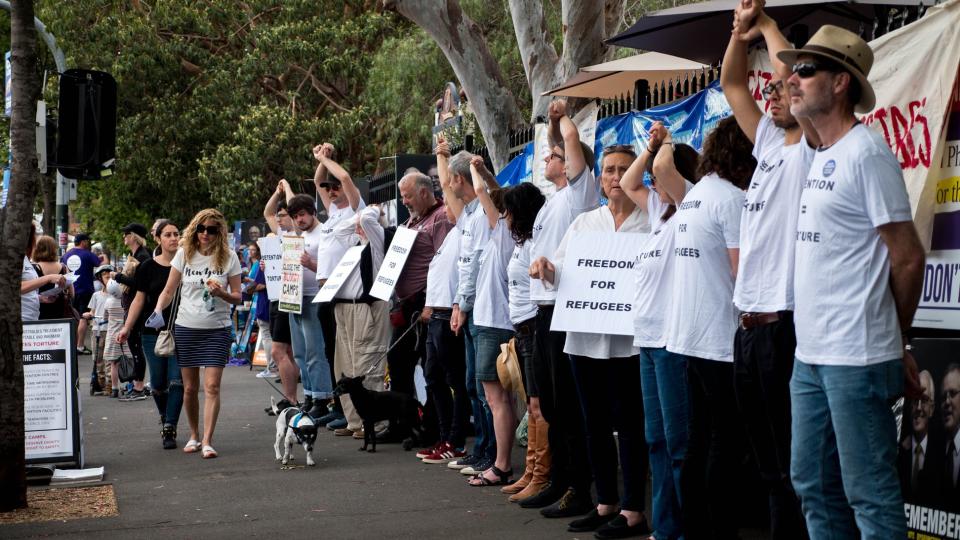Wentworth byelection result a win for progressive movements

While the margin by which independent candidate Dr Kerryn Phelps has won the Wentworth byelection may not be as great as the election night count suggested, the result in this historically-safe Liberal seat is a major blow for Prime Minister Scott Morrison and the federal Coalition government.
The swing against the Liberal Party was close to 20%, making it the biggest swing ever against a ruling party in a byelection.
While Phelps is no candidate of the left, her victory is a huge morale boost for those movements that have been fighting against a Coalition government that has continued shifting further to the right — as dramatised by the bloody leadership coup that unseated Malcolm Turnbull as PM earlier this year.
Phelps' campaign was directly identified with a number of key political issues: Australia's indefinite detention without trial of asylum seekers and refugees in horrendous camps on Nauru and Manus Island; climate change and the proposed Adani mega coalmine in north Queensland; and recent attacks on LGBTI rights.
The Coalition senators' vote for Pauline Hanson's racist “It's OK to be white” motion (later incredulously excused as a “administrative process failure”) and right-wing radio shock jock Alan Jones' successful bullying of the Sydney Opera House administration into using the iconic building as a giant billboard for the racing industry all added to the growing political firestorm of popular rejection of right-wing, big-business-first politics.
What the semi-spontaneous October 9 Sydney Opera House protest highlighted was that people are widely connecting the major social issues with the issue of class.
When Jones scolded Opera House chief executive Louise Herron with the words: “Who the hell do you think you are?”, many people thought: “Who the hell does Alan Jones and his rich and powerful mates think they are?”
Australia's rogue state behaviour on climate change and the government's promotion of overt racism are seen by many as ugly policies that seek to promote the interests of a rich and powerful minority.
The vote in Wentworth was sharply divided along class lines.
The wealthier harbourside suburbs of Vaucluse, Double Bay, Rose Bay and Bellevue Hills voted strongly for Liberal candidate Dave Sharma.
Those suburbs with the greatest numbers of renters, apartment dwellers and workers voted strongly for Phelps.
Labor and the Greens suffered negative swings of about 6%, as many people who would have normally voted for them shifted their votes to Phelps.
While the electorate houses the harbourside mansions and penthouses of the old and new rich, it also has one of the highest proportions of rental dwellings. This includes working-class people on a reasonable wage who can afford to rent in the area and younger “double-income no kids” couples who are attracted to the electorate's inner-city and ocean beach suburbs.
An October 20 report by ABC's Jamie McKinnell noted that the median age in the electorate is just 37 and that the family composition was made up of 45% couples without children.
The Wentworth byelection therefore also tells us something about how young people feel about this government.
Based on her record as a former Australian Medical Association president, current City of Sydney councillor and outspoken and openly lesbian celebrity commentator, Phelps could be characterised as socially liberal while economically conservative.
But that’s a label that equally describes the politics of most Labor and some Greens politicians. On issues such as refugee rights, climate change and LGBTI rights, Phelps is probably to the left of most Labor MPs.
The Coalition now has to struggle through its last months in power before the 2019 federal election as a minority government. While Phelps has not ruled out supporting a no-confidence motion against the government, she has strongly indicated that the next election should be held when it is due (by May 2019).
This period could shape the politics of the federal election for the better, especially if the Labor opposition finds the will to abandon its small-target political strategy and puts forward progressive bills on issues such as climate change, refugee rights and anti-discrimination laws.
It should also bring forward bills to remove anti-worker legislation and reverse the cuts to welfare and other social services.
This would put the Coalition government to the test – along with the new member for Wentworth.
[Peter Boyle is standing as a Socialist Alliance candidate for the NSW State Legislative Council in the 2019 State Election.]